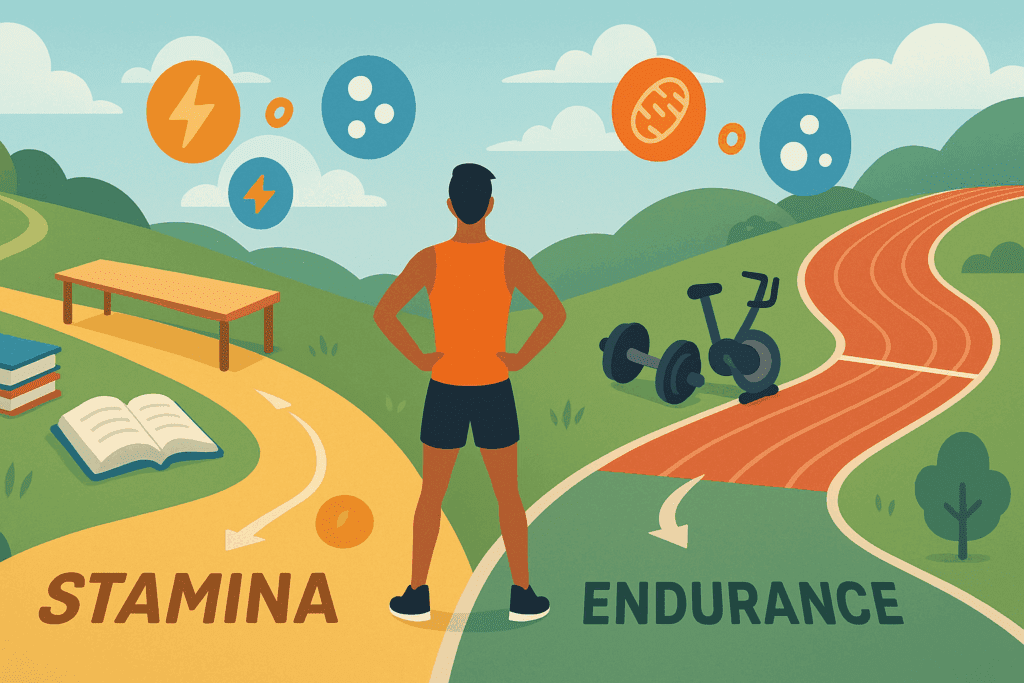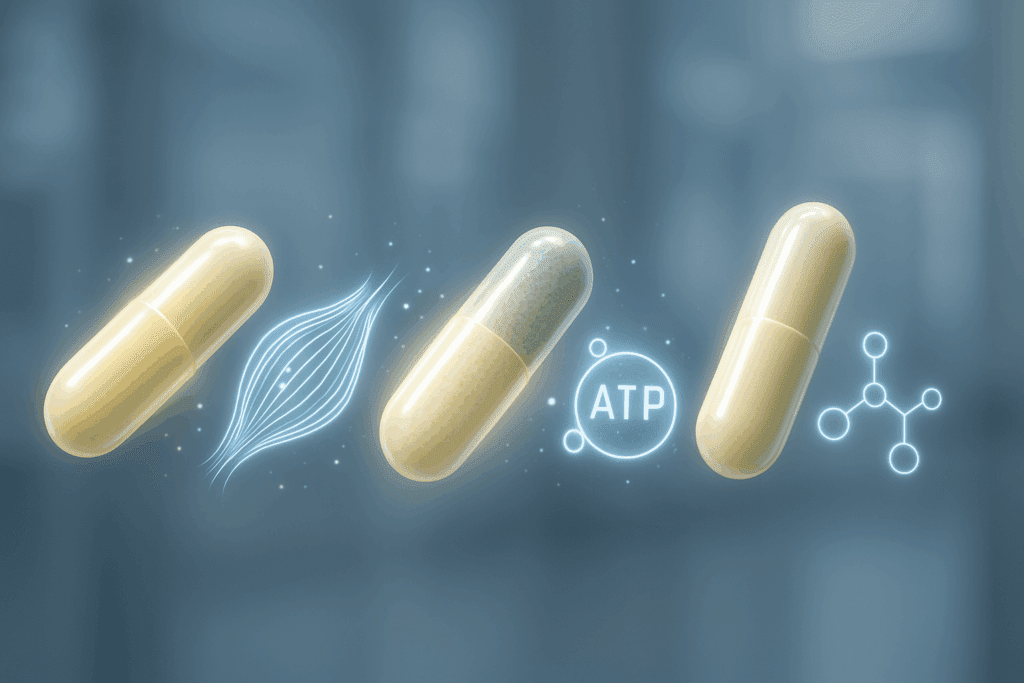In the pursuit of peak physical performance, athletes, fitness enthusiasts, and everyday individuals alike are constantly seeking effective ways to build stamina and endurance. While training regimens and diet undeniably play foundational roles, nutritional supplementation has emerged as a valuable component in optimizing physical capacity. The modern market is saturated with products that claim to enhance endurance, yet separating legitimate, science-backed options from fleeting trends requires careful scrutiny. When exploring the best supplements for stamina and endurance, it is essential to consider both empirical evidence and individual physiological responses. This article delves into the science behind endurance-enhancing supplements and offers a research-informed guide to building strength that truly lasts.
You may also like: Build Running Stamina Fast: Best Exercises to Increase Endurance and Boost Performance Naturally

Understanding Endurance and Stamina: Why They Matter
Endurance and stamina, though often used interchangeably, refer to distinct yet interrelated aspects of physical performance. Stamina generally describes the ability to sustain prolonged physical or mental effort, while endurance specifically refers to the body’s capacity to exert itself over time without fatigue. Both are critical to performance enhancement, whether in marathon running, high-intensity interval training, or even mentally demanding activities that require sustained focus. Achieving improvements in these areas calls for more than just willpower; it demands biochemical support.
At the cellular level, endurance is closely linked to the efficiency of energy production. Mitochondrial function, oxygen utilization, and muscle recovery are all key factors that contribute to an individual’s endurance capabilities. Supplements for endurance and stamina work by targeting these physiological pathways, either by increasing energy availability, improving blood flow, or reducing oxidative stress. Consequently, understanding the mechanisms by which different supplements operate helps in selecting the best options for personal performance goals.

The Role of Nutrition in Endurance Performance
Before delving into supplementation, it’s critical to acknowledge that nutrition forms the backbone of any performance-enhancing strategy. Macronutrient balance, hydration status, and micronutrient sufficiency all influence how effectively the body responds to exercise. For instance, carbohydrates serve as a primary energy source during prolonged exertion, and adequate protein intake is necessary for muscle repair and growth. However, even the most well-structured diets may fall short in providing the specific compounds needed to push performance boundaries.
This gap is where supplements come into play. They are not meant to replace a nutritious diet but rather to complement it by providing concentrated doses of bioactive compounds. When chosen wisely, the best endurance supplements act synergistically with dietary inputs to support stamina and recovery. Especially for endurance athletes, the strategic use of supplements can mean the difference between plateauing and progressing.
Best Supplements for Stamina and Endurance: A Scientific Overview
One of the most studied and widely recognized endurance-enhancing supplements is beta-alanine. This non-essential amino acid increases carnosine concentrations in muscles, which helps buffer the lactic acid that builds up during high-intensity exercise. Numerous studies have shown that beta-alanine supplementation improves performance in activities lasting from one to four minutes, making it a popular choice among sprinters, cyclists, and high-intensity trainers.
Another powerful supplement for improving endurance is creatine monohydrate. Although commonly associated with strength and power, creatine also enhances stamina by facilitating rapid ATP regeneration, the body’s main energy currency. Endurance athletes have found benefits in using creatine for high-intensity bursts during prolonged activities such as soccer, rowing, or cross-country skiing.
Caffeine is a staple in the endurance world, and its performance-enhancing effects are well-documented. As a central nervous system stimulant, caffeine reduces perceived exertion and delays fatigue, allowing athletes to train harder and longer. It also enhances fat oxidation, preserving glycogen stores for later stages of prolonged activity. For many, caffeine represents one of the best supplements for endurance athletes who seek an immediate and noticeable boost in performance.

Best Vitamins for Endurance Athletes: Supporting Cellular Energy
Vitamins play a crucial role in supporting the metabolic processes that underlie stamina. Among the best vitamins for endurance athletes, B vitamins stand out for their involvement in energy production and red blood cell formation. Vitamins B1 (thiamine), B2 (riboflavin), B3 (niacin), B6 (pyridoxine), and B12 (cobalamin) are all essential for converting nutrients into usable energy and transporting oxygen efficiently through the bloodstream. Deficiencies in these vitamins can lead to early fatigue, muscle weakness, and impaired cognitive function.
Vitamin D is another vital nutrient for endurance athletes. Though commonly associated with bone health, it also influences muscle function and immune resilience. Emerging research links adequate vitamin D levels to improved aerobic capacity and reduced inflammation after intense exercise. Considering that many people are deficient in this nutrient, supplementation can provide a noticeable improvement in stamina.
Iron, while technically a mineral, deserves mention here due to its indispensable role in oxygen transport. Without sufficient iron, hemoglobin levels drop, reducing the amount of oxygen delivered to working muscles. This can lead to a condition known as iron-deficiency anemia, which is particularly common among female endurance athletes. As such, iron supplementation, when monitored and prescribed responsibly, can be one of the most effective endurance supplements available.

Botanical and Herbal Endurance Enhancing Supplements
Nature offers a treasure trove of compounds that support stamina and recovery. Rhodiola rosea, a well-known adaptogen, has been shown to reduce fatigue and improve exercise performance by enhancing mitochondrial function and balancing stress hormones. Unlike stimulants, Rhodiola supports endurance without the risk of jitteriness or dependence.
Panax ginseng is another herbal supplement known for its stamina-building effects. Studies indicate that it can improve physical performance by increasing oxygen uptake and enhancing immune function. Regular use of ginseng may also reduce perceived exertion, enabling longer and more intense workouts.
Beetroot juice and its concentrated extracts have garnered attention in endurance circles for their high nitrate content. Nitrates help increase nitric oxide levels in the blood, which leads to improved blood flow, lower oxygen cost during exercise, and enhanced time-to-exhaustion metrics. For endurance athletes seeking a natural way to boost cardiovascular efficiency, beetroot is one of the best supplement options.

Evaluating the Best Supplement Brand for Endurance
With so many products on the market, selecting the best supplement brand for endurance can be overwhelming. Consumers should prioritize brands that offer third-party testing, transparent ingredient labeling, and clinically effective dosages. Look for certifications from organizations like NSF International or Informed-Sport, which verify product purity and safety for athletes.
Additionally, a reputable brand should back its claims with peer-reviewed research. Ingredients should not only be present but included in dosages that reflect those used in clinical trials. Avoid proprietary blends that obscure ingredient amounts, as they can make it difficult to assess effectiveness. When it comes to building strength that lasts, quality matters just as much as the active ingredients themselves.
Combining Supplements for Synergistic Effects
While individual supplements can be effective on their own, combining them strategically often yields superior results. For instance, pairing caffeine with beta-alanine can amplify both mental focus and muscular endurance. Similarly, stacking creatine with B vitamins ensures that both immediate energy demands and long-term recovery processes are supported.
Timing also plays a crucial role in maximizing supplement effectiveness. Caffeine and nitrates are best consumed pre-workout, while beta-alanine and creatine require consistent daily intake to saturate muscles. Post-exercise, antioxidants like vitamin C and E, although controversial in high doses, may support recovery by mitigating oxidative stress. Understanding how to use supplements synergistically and in appropriate timing can elevate an athlete’s training outcomes dramatically.
Supplements to Improve Endurance in Specific Populations
Endurance is not exclusive to elite athletes. Weekend warriors, aging adults, and individuals with chronic fatigue may all seek ways to improve stamina through supplementation. In older populations, mitochondrial function naturally declines, making compounds like CoQ10 and alpha-lipoic acid particularly useful. These supplements to boost endurance support cellular energy and may also benefit cardiovascular health.
For those recovering from illness or managing chronic stress, adaptogens such as ashwagandha or cordyceps can help rebalance the body and rebuild stamina over time. These supplements do not offer instant results but work gradually to restore hormonal balance and improve energy metabolism. As always, consulting a healthcare provider before starting any new regimen is essential, particularly for those with existing medical conditions or on medication.

Practical Considerations and Safety Guidelines
Despite their benefits, supplements are not magic pills. They work best when integrated into a comprehensive lifestyle approach that includes adequate sleep, balanced nutrition, and consistent training. Users must be wary of exaggerated claims and unverified testimonials, particularly when choosing supplements for endurance and stamina online. Regulatory oversight in the supplement industry is limited, which places a burden on consumers to perform due diligence.
Potential side effects must also be considered. For example, excessive caffeine can lead to insomnia, jitteriness, and elevated heart rate. Iron supplementation, if taken unnecessarily, can result in gastrointestinal distress or iron overload. Even well-tolerated compounds like beta-alanine may cause harmless but uncomfortable sensations such as skin tingling. These effects underscore the importance of appropriate dosing and individualized planning.
How to Choose the Best Endurance Supplements for Your Needs
There is no one-size-fits-all answer when it comes to the best supplements for endurance athletes or casual exercisers. Each person has unique metabolic needs, training demands, and health considerations. Those training for endurance events may benefit most from a combination of carbohydrate-electrolyte solutions, caffeine, and beetroot extracts, while others focused on high-intensity performance may prioritize beta-alanine and creatine.
Professional guidance from a sports nutritionist or physician can be invaluable in this process. By conducting nutrient assessments and considering factors like age, sex, training volume, and dietary intake, these experts can recommend tailored supplement strategies. In doing so, they help users not only choose effective products but also avoid wasting money on supplements with little scientific backing.
Frequently Asked Questions: Supplements for Stamina and Endurance
What makes a supplement effective for both stamina and endurance without overstimulation?
Effective supplements for endurance and stamina often work through mechanisms that support cellular energy production, improve blood flow, and reduce fatigue without resorting to harsh stimulants. For example, compounds like cordyceps and beetroot extract enhance endurance by optimizing oxygen efficiency and nitric oxide pathways rather than overwhelming the nervous system. These are ideal for individuals sensitive to caffeine or those seeking sustainable energy levels without crashes. When evaluating the best supplements for stamina and endurance, choosing products with adaptogenic or mitochondrial-supporting ingredients can make a significant difference in long-term performance. It’s not always about intensity—sustainable support often delivers better endurance over time.
How do supplements to boost endurance differ from those meant for strength training?
While both categories aim to enhance performance, the physiological targets they emphasize are different. Supplements for endurance and stamina generally focus on increasing aerobic capacity, improving oxygen transport, and delaying fatigue, using ingredients like B vitamins, Rhodiola rosea, and L-citrulline. In contrast, strength-oriented supplements often prioritize short-burst power through creatine, beta-hydroxy-beta-methylbutyrate (HMB), or testosterone boosters. The best endurance supplements support mitochondrial density and reduce muscle breakdown during extended exertion, while strength supplements enhance anaerobic performance. Understanding these distinctions allows athletes to tailor their supplement stacks based on the nature of their goals.
Can endurance enhancing supplements benefit people with sedentary lifestyles or chronic fatigue?
Yes, when used correctly and under medical supervision, endurance enhancing supplements can help individuals with low baseline energy levels gradually regain physical function. Nutrients like CoQ10 and magnesium malate, which support mitochondrial activity, have been studied in populations with chronic fatigue and fibromyalgia. While the best supplements for endurance athletes are formulated for high-performance needs, some formulations also suit those recovering from illness, burnout, or deconditioning. Supplements to improve endurance in this context serve more as restorative aids than performance boosters. It’s important to match supplement type and dose to an individual’s current health status rather than athletic aspiration alone.
How can athletes avoid dependency or overstimulation when using supplements to increase endurance?
One of the key strategies for avoiding dependency is cycling stimulants such as caffeine or synephrine, which can lose effectiveness over time. Instead of relying solely on these ingredients, athletes are encouraged to explore stamina building supplements that work through adaptogenic or metabolic pathways, like ashwagandha or B-complex vitamins. These compounds support hormonal balance and energy production without triggering tolerance or withdrawal. Choosing the best supplement brand for endurance often means finding those that prioritize long-term balance over short-term spikes. Responsible use, periodization, and rotation of supplement types help preserve efficacy while reducing physiological strain.
What role does gut health play in the effectiveness of supplements for endurance athletes?
Gut integrity and microbiome diversity significantly affect nutrient absorption, which in turn influences how well endurance supplements are utilized. Many of the best supplements for endurance athletes contain fat-soluble vitamins, amino acids, or adaptogens that require efficient digestion for maximum benefit. Emerging research also points to the role of gut bacteria in modulating energy levels, inflammation, and even mental stamina. Some formulations now include prebiotics or digestive enzymes to enhance bioavailability, ensuring that the body can actually absorb and use the active ingredients. Athletes with gastrointestinal issues may benefit more from liquid or liposomal forms of supplements for endurance and stamina.
Are there gender-specific considerations when choosing the best supplement for stamina?
Yes, biological differences in hormone levels, iron requirements, and muscle composition mean that men and women may benefit from different types of endurance supplements. For example, iron and folate are especially crucial for female endurance athletes due to menstrual losses and reproductive health considerations. Meanwhile, men may respond more dramatically to creatine or branched-chain amino acids for muscular endurance. When identifying the best supplements for stamina and endurance, personalized approaches based on gender, training goals, and metabolic differences often yield better outcomes than one-size-fits-all solutions. Customizing supplementation ensures physiological needs are met with precision.
What emerging ingredients are being researched as next-generation endurance supplements?
Researchers are increasingly looking at nootropics, novel peptides, and plant-based compounds as future additions to the list of best endurance supplements. Ingredients like NMN (nicotinamide mononucleotide), which boosts NAD+ levels, and PQQ (pyrroloquinoline quinone), known for mitochondrial biogenesis, are gaining popularity in sports science circles. These compounds may not just support stamina but also promote cellular resilience and faster recovery. Supplements to boost endurance are evolving to address aging-related declines in energy and incorporate broader wellness benefits. As the field of personalized nutrition advances, these newer ingredients may soon redefine what qualifies as the best supplements for endurance athletes.
How can you verify the credibility of a product labeled as one of the best supplement brands for endurance?
Verifying credibility requires a multi-pronged approach: look for third-party certifications (like NSF Certified for Sport), published clinical trials, and transparent ingredient sourcing. Trusted brands will offer access to Certificates of Analysis (CoA) for purity and potency, and they will not hide behind proprietary blends that obscure dosages. The best supplement brand for endurance will also avoid artificial additives that can diminish performance and health over time. Customer reviews and endorsements from professional athletes or sports nutritionists also help validate quality. Scrutinizing these elements ensures you’re investing in supplements that genuinely support endurance and stamina.
Can supplements for endurance athletes improve mental stamina as well?
Absolutely. Many of the physiological systems that govern physical endurance also influence cognitive function, especially under stress or fatigue. Adaptogens such as Rhodiola and ginseng, often found in supplements for endurance athletes, have shown benefits for attention, reaction time, and mental resilience. Similarly, B vitamins and magnesium contribute to neurotransmitter balance and can buffer against the mental fog associated with overtraining. The best vitamins for endurance athletes aren’t just about muscle support—they also sustain mood and motivation during extended periods of physical and cognitive demand. Mental endurance, particularly in competitive sports, is just as critical as physical stamina.
How should athletes adjust their intake of stamina building supplements during competition season?
During peak performance phases, nutrient demands increase and recovery windows shrink, necessitating strategic supplementation. Athletes may need to increase their intake of antioxidants, electrolytes, and carbohydrate-based endurance supplements to match the intensity of competition. It’s also common to fine-tune pre-event protocols by including fast-acting supplements to boost endurance, such as caffeine or nitrate-rich beetroot extract. Meanwhile, post-event routines should focus on reducing inflammation and restoring glycogen with supplements to improve endurance over the long term. Working with a sports dietitian ensures proper periodization and prevents overuse or nutrient imbalances during critical training windows.
Conclusion: Unlocking Peak Performance with Science-Backed Supplements for Stamina and Endurance
Building strength that lasts requires more than physical effort—it demands strategic, evidence-based support. The best supplements for stamina and endurance are those grounded in scientific research and tailored to individual needs. Whether you’re an elite athlete pushing your limits or someone simply looking to boost your daily energy, endurance supplements can be a powerful tool in your wellness arsenal. From beta-alanine and creatine to herbal adaptogens and essential vitamins, these compounds work through different pathways to enhance physical capacity, delay fatigue, and promote recovery.
Choosing the best supplement brand for endurance is equally important. Trustworthy brands that emphasize transparency, efficacy, and third-party testing ensure that you’re getting products that support—not sabotage—your performance goals. With the right knowledge and a thoughtful approach, supplements to increase endurance can help you go further, train harder, and recover faster.
Ultimately, it’s the synergy of training, nutrition, and targeted supplementation that builds true, lasting strength. By integrating the best supplements for endurance and stamina into a comprehensive wellness strategy, individuals can unlock new levels of physical performance and long-term health resilience.
Was this article helpful? Don’t let it stop with you. Share it right now with someone who needs to see it—whether it’s a friend, a colleague, or your whole network. And if staying ahead on this topic matters to you, subscribe to this publication for the most up-to-date information. You’ll get the latest insights delivered straight to you—no searching, no missing out.
Further Reading:
The best vitamins and supplements for energy

